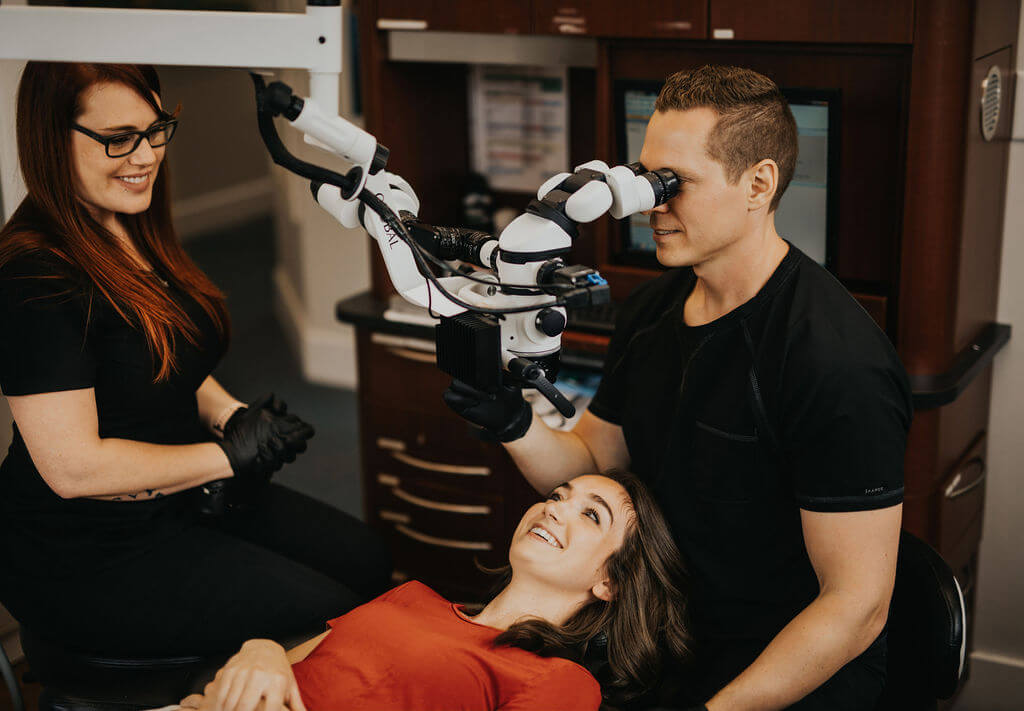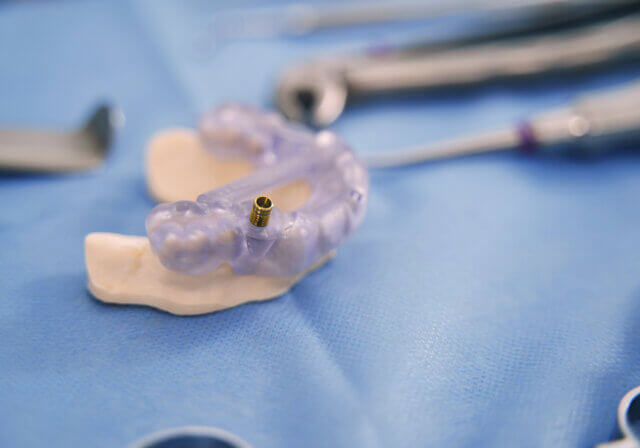At Kelowna Dental Centre, it’s the job of my team and me to make sure that you’re not only satisfied with your care but also that we have presented you with all of your options in a transparent and frank way. In other words, we know you want the whole tooth and nothing but the tooth.
Ok, that was bad, but in all seriousness, we want you to be able to make informed decisions about your dental health. And we want you to understand why we recommend specific care plans over others.
When it comes to replacing damaged or decayed teeth, the two most common treatments we prescribe are crowns or dental implants. But just what is a dental crown, and how does it differ from (and overlap with!) dental implant treatments?
Dental Crowns: A Royal Treatment for Your Teeth
A dental crown is like a hat (or, well, a crown) for your tooth. It covers the tooth’s visible part and is placed after the decayed part of the original tooth is removed.
Dental crowns are typically made of metal, which is durable, made to withstand pressure from chewing and biting; porcelain-fused-to-metal, which is undetectable and fitted perfectly to match the colour of your teeth; or ceramic, which is ideal for those with metal allergies.
Crowns provide support for decay-damaged teeth and help prevent further decay. They can also protect your teeth after a root canal procedure, hold a cracked tooth in place, and even improve the appearance of your teeth.
Crowns are often less expensive and allow you to keep your natural tooth. However, keep in mind that to fit a crown, we may need to file down your tooth, resulting in some sensitivity after the procedure.
Sounds simple enough, right? Well, that’s more or less the case. But, as with any treatment, there’s a flip side to the dental coin.
In terms of aftercare and longevity, crowns can last 10 to 20 years – which is pretty good! However, the dental cement used to hold the crown in place may erode over time. Plus, there’s a risk of the crown chipping.
Also, they’re at risk of getting cavities underneath them, and bacteria can seep beneath the crown. Just like with implants or any dental procedure, routine hygiene practices and regular appointments help reduce the risk of these complications.
Now, let’s polish off our crown discussion with a few more positives! Typically, the experience of receiving a crown is less intense than receiving an implant. Smaller crown appointments, such as one to three crowns, can be done comfortably with just local anesthetic.
For full-mouth crown procedures, IV sedation provides considerable relief – for your physical comfort and peace of mind! We can take care of most crown treatments in just two appointments: one to prepare the tooth and another two weeks later to place the crown.
Our rule of thumb? If a tooth has enough structure and supporting bone, the recommendation is to maintain the tooth by placing a crown on it. BUT. If the tooth is too damaged due to decay or disease, it must be removed and an implant placed instead.
This brings us to *drum roll* a quick refresher on dental implants!
Dental Implants: Addressing the Root Problem
A dental implant is a titanium fixture that replaces the tooth’s root in the jawbone with a crown on top. They require more appointments and a more extended healing period (often two to four months) before a crown can be placed on top.
While it’s a more invasive procedure and often more expensive, they cannot decay, offer a more permanent solution, and won’t affect your surrounding teeth negatively, which is the case with Bridging spaces.
You might be thinking, “Why are we even talking about crowns? Sign me up for an implant—it’s a complete, more permanent tooth!”
First of all, I love your enthusiasm. And you’re right. Dental implants offer a lot of valuable benefits. But there are benefits to both options, and the right choice will depend on your unique needs and health goals.
Your Health, Your Smile. In Your Hands
Thankfully, you have my wonderful, experienced team and me to make sure you understand the risks and rewards of each option to make the most informed choice.
Let’s use an analogy: a standard pair of trainers will keep your feet comfortable and protected if you’re going on a run. But if you’ve recently recovered from an ankle injury, you’ll need sturdier, higher-quality shoes to keep your feet happy. Similarly, if your tooth just needs a little extra support, a crown might be enough, but if your tooth needs to be replaced altogether, an implant is the right choice.
Ultimately, I want my patients to feel comfortable reaching out to me and confident that they won’t be judged based on their need for care. Most dental issues are actually due to individual susceptibility beyond our control.
At the end of the day, the best thing to do is to schedule an appointment. All of the treatment options we recommend are chosen collaboratively with you, our patient, after learning your desired outcomes and providing you with all your options.
So, don’t be intimidated—you’ll be on your way to a healthy, beautiful smile in no time! And we proudly offer flexible payment options through PaySpyre that fit any budget, so you don’t have to worry that your finances will keep you from the best care.
If you want to restore your smile confidence, contact us today to learn more about dental implant and crown treatment options at Kelowna Dental Centre. We can’t wait to care for you!
Dr. Michael Webster
Kelowna Dental Centre Owner
General Dentist
Kelowna Implant Dentist
Dental Implants Kelowna



